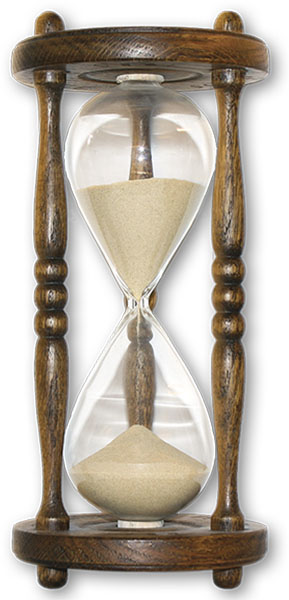Of all the common objects we use every day, few – perhaps no other – elicit such peculiar considerations as the clock.
Simple in appearance, it is, however, a complex device which, in the most diverse shapes and sizes, constitutes part of our furnishings and amenities, adorning both conspicuous public monuments and simple homes. It must be acknowledged that, wherever one is found, it is difficult to remain indifferent to the powerful attraction of the “tick-tock” associated with the continuous movement of needles and pendulums, especially when set in an elaborate and artistic framework.
Nevertheless, without belittling the mechanical apparatus, the flow of tiny grains of sand in an hour glass, draining downwards until they run out, seems to speak more to the human soul. Perhaps because, more than a clock, the hour glass evokes the fleeting nature of time…
But what is time? Eminent philosophers and scientists have expounded tirelessly on it, in an attempt to explain its nature, without succeeding in more than describing its accidents. According to some, of all that is knowable, nothing is so neglected; others have used it to formulate complex quantum and sidereal theories, although they failed to completely lift its veil of mystery.
The Angelic Doctor defines time as the measure of the duration of contingent creatures, subject to generation and corruption.1 We can thus affirm that, for each one of us individually, time is nothing more than an instant between two eternities, covering the interval between our birth and our death.

And because a thousand years, compared to eternity, are but the blink of an eye (cf. Ps 90:4), time seems a mere illusion, a simple and fleeting reflection of the everlasting life of the substantial Being who gives meaning to everything, far above the “tick-tock” of the clock: God.
Although it is ephemeral, time is also sublime. Let us remember that the Eternal One wanted to become incarnate, entering into time to redeem those who, through disobedience, made every second on this earth a lament and a tear to be poured into the chalice of justice.
From this perspective, we perceive clearly that the tiny grains in the hourglass of our life is not mere sand or ignoble matter. On the contrary, every second purchased with the redeeming Blood is gold dust; every instant spent on earth can determine our eternal destiny through acts of virtue, however small, or through infidelities.
An expression commonly attributed to the famous English playwright William Shakespeare wisely reflects: “Time is too slow for those who wait, too swift for those who fear, too long for those who grieve, too short for those who rejoice, but for those who love, time is eternity.”
It is indeed eternity… In fact, of the three theological virtues, charity is the only one which will remain when we depart this life (cf. 1 Cor 13:13). Thus, the smallest moments spent away from love of God are time wasted, time that we will inevitably be called to account for.
Let us stop for a moment at the beginning of this year and ask ourselves: how do we manage this precious gift that God has given us? If we are honest with ourselves, we will probably find that, as Paul Claudel said, “it is not time that is lacking to us, it is we who are lacking in our use of it.”
Let us not allow the golden dust of time to be disgracefully blown away by the winds of banality, laziness, worldliness, selfishness and shameful pettiness. Rather, let every millisecond of our existence be a battle cry against evil, a flame of love for God, a burnt offering on his altar. ◊
Notes
1 Cf. ST. THOMAS AQUINAS. Summa Theologiæ. I, q.10, a.4, ad 3.


